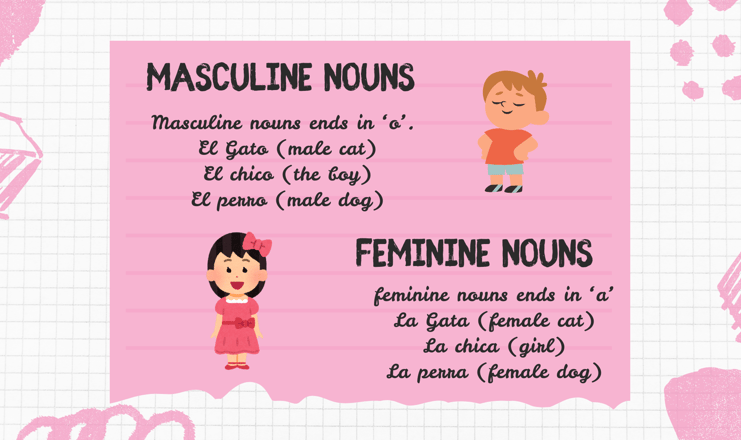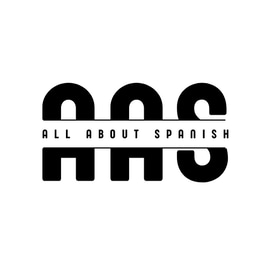START YOUR SPANISH LEARNING JOURNEY
NOUNS - LOS SUSTANTIVOS
Nouns or sustantivos in Spanish are names of the places, people, objects, concepts and even feelings. Many of the Spanish words have a specific ending which indicates it is a noun.
12/20/20243 min read


Nouns or sustantivos in Spanish are names of the places, people, objects, concepts and even feelings. Many of the Spanish words have a specific ending which indicates it is a noun.
In Spanish, nouns have gender which does not mean they are feminine or masculine physically, but in a grammatical sense. There are two types of nouns in Spanish, masculine nouns and feminine nouns.
MASCULINE NOUNS
Masculine nouns ends in ‘o’. Nouns that ends in o are masculine in a grammatical sense. It means that the person, animal and objects are grammatically masculine.
1. El niño ( The boy )
2. El cartero ( The postman)
3. El teatro ( The theatre)
4. El tío ( The uncle )
5. El dormitorio ( The bedroom )
Masculine noun that don’t end in ‘o’ –
Ending -ma {El programa (the program), el idioma (the language), el drama (the drama)}
Ending –e {El maquillaje (the makeup), el perfume (the perfume), el estante (the shelf)}
An accented vowel (é, á, í, and ú) {El ají (the chilli pepper), el colibrí (the hummingbird), el nandú (the rhea)}
A consonant other than d, z { El árbol (the tree), el cojín (the cusion), el rumor (the rumour)}
Not all words that end in –ma are masculine. Some words like la forma (form) are feminine.
There are also very common words that end in –e are also feminine, so the rule is to be taken with a grain of salt.
EXCEPTIONS TO THE RULE
La moto (motorcycle) ,La foto (photo),La libido (libido), La radio (radio), La mano (hand), La virago (virago), La polio (polio), La flor (flour), La clave (key, code), La sal (salt),La sangre (blood), La suerte (luck), La miel (honey), La nube (cloud), La muerte (dead), La piel (skin), La fiebre (fever), La serpiente (snake), La hiel (bile), La carne (meat), La tarde (evening), La coliflor (coliflour), La frase (sentence), La madre (mother), La labor (labour), La gente (people), La base (base), La llave (key), La calle (street), La clase (class), La noche (night), La nieve (snow), La torre (tower), La corriente (common, current), La sede (headquarters), La Fuente (fountain)
FEMININE NOUNS
Most of the feminine nouns ends in ‘a’. Ending in an a basically indicates that the idea, person, object and animals is grammatically female.
1. La profesora (the professor)
2. La enfermera (the nurse)
3. La hija (the daughter)
4. La guitarra (the guitar)
5. La piscina ( the swimming pool)
6. La rosa (the rose)
Feminine nouns that don’t end in an ‘a’-
Ending -ión {La canción (the song), la religion (the religion)}
Ending z {La luz (the light), la paz (the peace), la nariz (the nose)}
Ending d {La felicidad (happiness), la salud (the health), la virtud (virtue, power)}
EXCEPTIONS TO THE RULE
El enigma (enigma), El prisma (perspective), El huésped (the guest), El ajedrez (the chess), El avestruz (the ostrich), El sentención (the severe sentence), El día (the day), El lápiz (the pencil), El idioma (language), El fantasma (the ghost), El abad (the abbot), El césped (the lawn), El estratega (the strategist),El diagram (the diagram), El alud (the landslide), El record (the record), El morfema (the morpheme), El clima (the climate), El ataúd (the coffin), El pez (the fish), El mapa (the map), El charisma (charisma), El áspid ( the asp), El arroz (the rice), El planeta (the planet), El buda (the Buddha), El notición ( the big news), El cáliz (the chalice), El Sistema (the system), El tema (the subject), El milord (the milord), El aprendiz (the apprentice), El antifaz (the mask), El maiz (corn), El altavoz (the loudspeaker), El disfraz (the disguise), El albornoz (the bathrobe), El barniz (varnish), El cariz ( the look), El haz (the bundle)
Nouns usually occurs as the subject in the beginning of a sentence or as an object at the end of a sentence.
So, as long as you follow these Spanish grammar rules to learn nouns in Spanish, you’re good to go!
